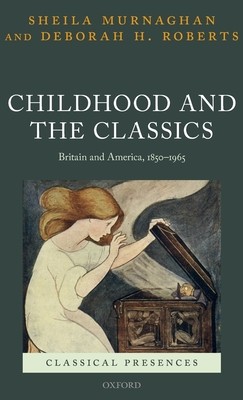
- We will send in 10–14 business days.
- Author: Sheila Murnaghan
- Publisher: Oxford University Press, USA
- ISBN-10: 0199583471
- ISBN-13: 9780199583478
- Format: 14.7 x 21.8 x 2.5 cm, hardcover
- Language: English
- SAVE -10% with code: EXTRA
Reviews
Description
The dissemination of classical material to children has long been a major form of popularization with far-reaching effects, although until very recently it has received almost no attention within the growing field of classical reception studies. This volume explores the ways in which children encountered the world of ancient Greece and Rome in Britain and the United States over a century-long period beginning in the 1850s, as well as adults' literary responses to their own childhood encounters with antiquity. Rather than discussing the role of classics in education, it focuses on books read for enjoyment, and on two genres of children's literature in particular: the myth collection and the historical novel. The tradition of myths retold as children's stories is traced in the work of writers and illustrators from Nathaniel Hawthorne and Charles Kingsley to Roger Lancelyn Green and Ingri and Edgar Parin D'Aulaire, while the discussion of historical fiction focuses particularly on
the roles of nationality and gender in the construction of an ancient world for modern children. The book concludes with an investigation of the connections between childhood and antiquity made by writers for adults, including James Joyce, Virginia Woolf, and H.D. Recognition of the fundamental role in children's literature of adults' ideas about what children want or need is balanced throughout by attention to the ways in which child readers have made such works their own. The formative experiences of antiquity discussed throughout help to explain why despite growing uncertainty about the appeal of antiquity to modern children, the classical past remains perennially interesting and inspiring.
EXTRA 10 % discount with code: EXTRA
The promotion ends in 20d.21:24:24
The discount code is valid when purchasing from 10 €. Discounts do not stack.
- Author: Sheila Murnaghan
- Publisher: Oxford University Press, USA
- ISBN-10: 0199583471
- ISBN-13: 9780199583478
- Format: 14.7 x 21.8 x 2.5 cm, hardcover
- Language: English English
The dissemination of classical material to children has long been a major form of popularization with far-reaching effects, although until very recently it has received almost no attention within the growing field of classical reception studies. This volume explores the ways in which children encountered the world of ancient Greece and Rome in Britain and the United States over a century-long period beginning in the 1850s, as well as adults' literary responses to their own childhood encounters with antiquity. Rather than discussing the role of classics in education, it focuses on books read for enjoyment, and on two genres of children's literature in particular: the myth collection and the historical novel. The tradition of myths retold as children's stories is traced in the work of writers and illustrators from Nathaniel Hawthorne and Charles Kingsley to Roger Lancelyn Green and Ingri and Edgar Parin D'Aulaire, while the discussion of historical fiction focuses particularly on
the roles of nationality and gender in the construction of an ancient world for modern children. The book concludes with an investigation of the connections between childhood and antiquity made by writers for adults, including James Joyce, Virginia Woolf, and H.D. Recognition of the fundamental role in children's literature of adults' ideas about what children want or need is balanced throughout by attention to the ways in which child readers have made such works their own. The formative experiences of antiquity discussed throughout help to explain why despite growing uncertainty about the appeal of antiquity to modern children, the classical past remains perennially interesting and inspiring.


Reviews